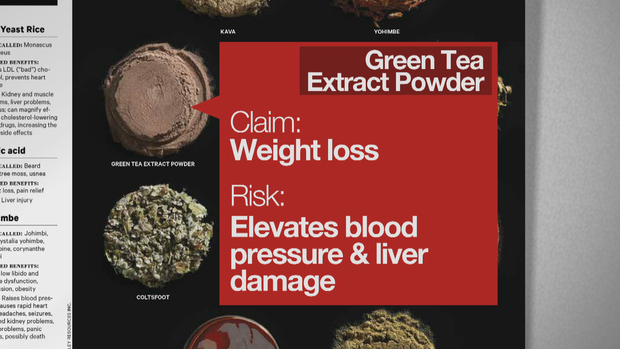Supplements meant to help couple get pregnant land husband in hospital
Dietary supplements are a $40 billion a year industry in the United States. But as CBS News' Dr. Tara Narula reports, a new report finds serious health risks that send thousands of people a year to emergency rooms.
Forty-three-year-old tattoo artist Bobby Cimorelli and his wife Margaret have struggled to get pregnant. Cimorelli decided to try over-the-counter testosterone supplements.
"I was really bloated, my blood pressure was really high," Cimorelli said. Within weeks, he wound up in the emergency room. Doctors said the supplements were the likely culprit.
"I had no idea that there were side effects, I thought it was just like regular vitamins."
Cimorelli is one of the roughly 200 million Americans taking dietary supplements. On Wednesday, consumer reports identified 15 commonly-used supplement ingredients that could be potentially harmful.
For example:
- Red yeast rice to lower cholesterol may cause kidney and liver problems
- Green tea extract powder for weight loss may elevate blood pressure and cause liver damage
- Kava to reduce anxiety may exacerbate depression
One area of concern is that supplements do not undergo the rigorous regulatory scrutiny applied to prescription drugs and other over-the-counter medicines.
"The problem is supplements look just like these drugs on store shelves, but the requirements to get a supplement on the store shelves is nothing like what it takes to sell aspirin or Tylenol," said Dr. Pieter Cohen of Harvard Medical School.
Dr. Aida Vega is an internist at Mount Sinai Hospital. She explained that doctors and patients often don't discuss supplements, which can lead to problems.
It is important for physicians to understand why their patient is taking or wants to take a supplement, Dr. Vega said.
"If you understand why they're taking it, you can steer them in the proper direction."
The supplement industry says overwhelmingly that supplements are safe and play a valuable role. But doctors worry lax regulation and enforcement means products could be contaminated, mislabeled, or interact in dangerous ways with prescription medication.

